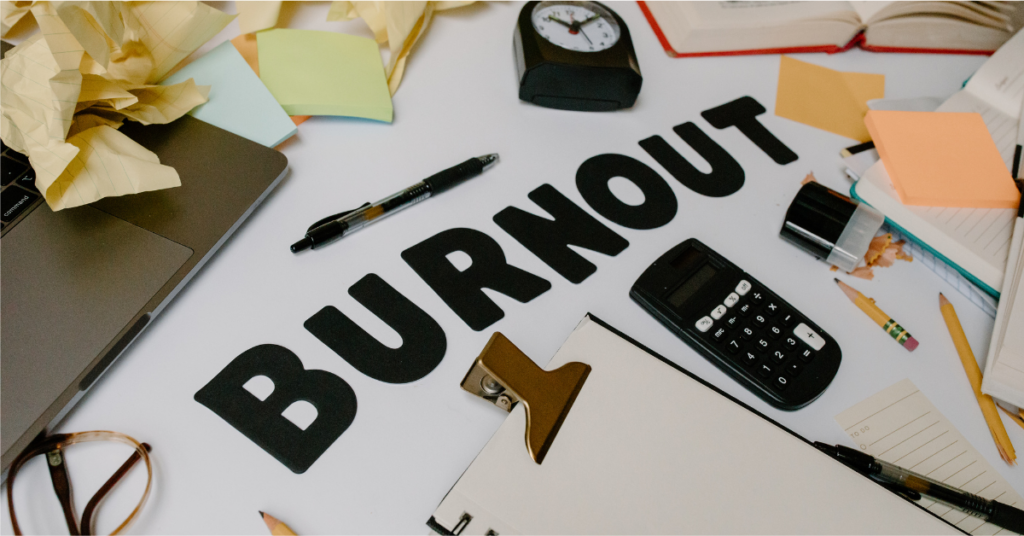What is Job Burnout and How to Beat It in 9 Easy Steps

- What is the Definition of Job Burnout?
- Causes of Job Burnout
- The Gradual Onset of Burnout
- Differentiating Burnout From General Stress
- The Psychological Signs of Job Burnout
- Physical Signs of Job Burnout
- What are the Common Signs of Job Burnout?
- Ways to Overcome Job Burnout
- Frequently Asked Questions About Job Burnout
There is no denying that we currently inhabit a fast-paced, high-speed, and aggressive professional landscape. This work culture has many visible downsides, and job burnout is one of them. It has emerged as a common challenge, especially for mid-senior professionals. According to a 2022 Statista report, 38% of employees in India reported high rates of burnout and distress symptoms. Given the myriad problems caused by job burnout, it’s imperative to recognize its symptoms and tackle them effectively. This blog is designed to identify the signs of job burnout and offers actionable strategies to address them.
What is the Definition of Job Burnout?
The World Health Organization (WHO) defines job burnout as a syndrome resulting from unaddressed chronic workplace-related stress. This condition subtly develops and can impact mental and physical health. A 2023 survey conducted by the McKinsey Health Institute reveals that Indian workers have the highest incidence of burnout symptoms (59%) globally. Therefore, recognizing this condition is essential for effective management and enhancing the well-being of employees.
Causes of Job Burnout
Unrealistic deadlines set by employers often lead to excessive stress, significantly contributing to job burnout. Furthermore, a lack of support or recognition from leadership can leave employees feeling undervalued and overworked, exacerbating the issue. Working long hours or on weekends disrupts the crucial work-life balance, thereby increasing the likelihood of experiencing this condition. For women, apart from these factors, gender-based challenges such as sexual harassment and microaggression can be key factors in job burnout, adding an additional layer of stress and emotional toll.
The Gradual Onset of Burnout
Job burnout typically accumulates over time, making early detection challenging. Understanding its progressive nature is the key to timely intervention and preventing professional exhaustion.
Differentiating Burnout From General Stress
Distinguishing burnout from everyday stress is vital. While stress is a common response, burnout is emotional, physical, and mental exhaustion from prolonged stress, impacting work-life balance.
Chronic stress is central to workplace-related burnout development. Persistent, overwhelming stress can lead to burnout, significantly affecting job satisfaction and employee well-being.
The Psychological Signs of Job Burnout
Job burnout can profoundly affect one’s psychology, including feelings of helplessness. This leads to decreased professional enthusiasm and career satisfaction. Understanding the psychological signs of job burnout is essential for maintaining mental health and well-being. Symptoms include persistent feelings of cynicism, detachment, and a lack of motivation. These psychological signs of job burnout can lead to decreased job satisfaction and performance. Individuals may also experience anxiety, depression, and difficulty concentrating. Recognizing these signs early allows for timely intervention, such as seeking professional support, implementing stress management strategies, and fostering a healthier work environment to prevent further deterioration of mental health.
Physical Signs of Job Burnout
ALSO READ: Top 10 Job Skills to Boost Your Career in a Dynamic Work Environment
What are the Common Signs of Job Burnout?
1. Emotional Exhaustion
Feeling drained and emotionally depleted is a key sign of job burnout. It eventually leads to a sense of dread about work. For example, a professional who used to be energetic and proactive may start feeling indifferent or hopeless, indicating emotional exhaustion. This state not only affects their work-life balance but also their overall job satisfaction and performance.
2. Reduced Performance
A noticeable decline in job performance can indicate burnout. An employee who once met deadlines easily might start missing them or making errors. It is a clear sign of reduced performance due to job burnout. This decline often leads to a vicious cycle of increased stress and further reduced performance.
3. Detachment From Work
An increasing sense of detachment or cynicism toward one’s job is a red flag. For instance, a professional who was once passionate about their career might start feeling disconnected, viewing their job as just a series of tasks. This detachment is a significant indicator of job burnout and can severely impact employee well-being.
4. Physical Symptoms
Physical symptoms like headaches, sleep disturbances, or gastrointestinal issues can be manifestations of job burnout. A salesperson experiencing constant headaches or a teacher having trouble sleeping could be physical signs of burnout. These symptoms often result from prolonged work-related stress and can hinder professional efficiency and health.
5. Lack of Motivation
A significant drop in motivation or enthusiasm for work is a telltale sign of burnout, often leading to decreased productivity. The lack of motivation not only affects their career satisfaction but also contributes to professional exhaustion.
6. Strained Family Relationships
Problems in family life can also be a sign of burnout. For instance, a seasoned professional suddenly having frequent arguments at home might be a sign of burnout.
7. Withdrawal From Social Activities
Withdrawal from social activities is another indicator of job burnout. An employee who used to enjoy team outings but now avoids them might be experiencing burnout, leading to social withdrawal. This change in social behavior can be a sign of the broader impact of job burnout on their overall well-being.
ALSO READ: What is Quiet Hiring, and Why is It Gaining Popularity in India?
Ways to Overcome Job Burnout
1. Prioritize Self-Care
Prioritizing self-care is crucial in overcoming job burnout. Engaging in activities like exercise or meditation can significantly improve work-life balance and reduce stress. This approach not only aids in managing work-related stress but also enhances overall employee well-being.
2. Set Clear Boundaries
Setting clear boundaries between work and personal life is essential for preventing job burnout. Designate specific work hours and stick to them to maintain a healthy work-life balance. This practice helps in reducing professional exhaustion and improving job satisfaction.
3. Seek Professional Help
If job burnout becomes overwhelming, seeking professional help can be a wise step. Therapists or career coaches can offer strategies for stress management and overcoming burnout. They can help with your mental health and teach you to be better at handling stress.
4. Reevaluate Your Job Role
Sometimes, reevaluating your job role is necessary to address job burnout. Evaluate if your current position aligns with your career goals and personal values. This introspection can lead to significant changes that improve job satisfaction and reduce feelings of burnout.
ALSO READ: How to List Education on a Resume: A Comprehensive Guide for Professionals
5. Develop a Support Network
Building a support network at work can be instrumental in overcoming job burnout. Connect with colleagues who understand your challenges and can offer support. Your peer network can provide a sense of community and aid in managing work-related stress like no other.
6. Improve Time Management
Effective time management is key to preventing job burnout. Prioritize tasks and set realistic deadlines to avoid professional exhaustion. Good time management leads to more efficient work, reducing stress and improving job satisfaction.
7. Take Regular Breaks
Taking regular breaks throughout the workday is important for preventing burnout. Short breaks help rejuvenate the mind and body, reducing the risk of professional exhaustion. This practice contributes to better focus and productivity.
8. Pursue a Hobby or Interest
Engaging in a hobby or interest outside of work can be a great way to combat job burnout. This diversion provides a mental break from work-related stress and can improve overall well-being and work-life balance.
9. Practice Gratitude
Practicing gratitude can shift your perspective and help you overcome job burnout. Reflect on the positive aspects of your job and life. This can enhance job satisfaction and reduce feelings of professional exhaustion.
While some measures can be taken on your own, talking to your employers about your situation might also prove beneficial. In the past few years, mental well-being has become a prominent issue. And recent data suggests that employers are becoming increasingly concerned about the psychological well-being of their employees. Therefore, keeping your organization in the loop might be a good idea if you want to successfully address job burnout.
ALSO READ: The Top 10 Career Options to Consider After 12th Arts in 2024
Frequently Asked Questions About Job Burnout
1. How Does Job Burnout Affect Job Performance and Productivity?
Job burnout significantly diminishes job performance and productivity; for instance, an overworked employee may show reduced efficiency and creativity. Additionally, burnout often leads to increased errors and a lack of focus, further impacting work quality. Moreover, employees suffering from burnout typically experience decreased motivation, which directly affects their productivity and overall contribution to the workplace.
2. What are the Main Causes of Job Burnout in Mid-Senior Professionals?
The main causes of burnout in mid-senior professionals often include unrealistic deadlines, which create excessive stress and pressure. Furthermore, a lack of support or recognition from leadership can leave professionals feeling undervalued and overworked. Additionally, working long hours disrupts work-life balance, significantly contributing to burnout among these experienced professionals.
3. How Can Mid-Senior Professionals Maintain a Healthy Work-Life Balance to Prevent Burnout?
To maintain a healthy work-life balance and prevent burnout, mid-senior professionals should set clear boundaries between work and personal life. Additionally, they should practice effective time management to avoid overworking and ensure sufficient time for relaxation. Moreover, engaging in regular physical and mental wellness activities can help mitigate stress, thereby reducing the risk of job burnout.
ALSO READ: How to Effectively Answer “What are Your Career Aspirations?” in a Job Interview
To conclude, if you are stressed at the workplace and looking for solutions to address job burnout, try upskilling in order to find a more suitable job role. Also, explore Emeritus’ online courses to upskill and advance your career.
Write to us at content@emeritus.org



